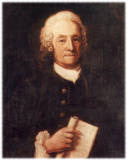Emanuel Swedenborg
 Emanuel
Swedenborg was born in Stockholm, Sweden, in 1688, and died in London,
England in 1772. Educated at the University of Uppsala, Swedenborg studied
philosophy, mathematics, science and eloquence, as well as Latin, Greek
and Hebrew. In the years following his formal education, he mastered a
wide variety of fields such as cosmology, mathematics, anatomy, physiology,
psychology, politics, economics, metallurgy, mineralogy, geology, mining
engineering, and chemistry. During this period of his life, Swedenborg
published a series of works that established his European reputation as
a scientist of the first order.
Emanuel
Swedenborg was born in Stockholm, Sweden, in 1688, and died in London,
England in 1772. Educated at the University of Uppsala, Swedenborg studied
philosophy, mathematics, science and eloquence, as well as Latin, Greek
and Hebrew. In the years following his formal education, he mastered a
wide variety of fields such as cosmology, mathematics, anatomy, physiology,
psychology, politics, economics, metallurgy, mineralogy, geology, mining
engineering, and chemistry. During this period of his life, Swedenborg
published a series of works that established his European reputation as
a scientist of the first order.
 Throughout
the period of his scientific work, Swedenborg maintained a deep interest
in religion. For example, the aim of much of his research in physiology
and psychology was to discover the mechanism by which the soul operated
in the human body. Then, at the age of fifty-five, Swedenborg experienced
a series of religious visions that were to change the course of his life.
He shifted his focus away from his scientific work, and for the next twenty-seven
years until his death he devoted himself almost exclusively to publishing
twenty-five volumes of theology. These works constitute a unified system
of theological thought, presenting a new vision of Christianity. Swedenborg
calls this the New Church. Some of its fundamental concepts include:
Throughout
the period of his scientific work, Swedenborg maintained a deep interest
in religion. For example, the aim of much of his research in physiology
and psychology was to discover the mechanism by which the soul operated
in the human body. Then, at the age of fifty-five, Swedenborg experienced
a series of religious visions that were to change the course of his life.
He shifted his focus away from his scientific work, and for the next twenty-seven
years until his death he devoted himself almost exclusively to publishing
twenty-five volumes of theology. These works constitute a unified system
of theological thought, presenting a new vision of Christianity. Swedenborg
calls this the New Church. Some of its fundamental concepts include:
•The Lord God Jesus Christ is the Creator and Redeemer of the human race.
• The Word of the Lord (the Bible) is the medium of union between
God and the human race. In addition to the plain teachings of the Word,
every story also has deeper meanings that relate to our own spiritual
growth and development.
• True charity is obedience to the Lord’s teachings (such
as the Ten Commandments and the Golden Rule) in a life of usefulness to
family, community, nation, and church.
• The Lord gives every person the ability to understand the difference
between good and evil and the freedom to choose between them.
• People of all religions are welcomed into heaven if they have lived a good life according to what they sincerely believe to be God's will.
• True marriage love continues to eternity in heaven.
A number of church and educational organizations based on New Church teachings began to appear after Swedenborg's death. For a full biography of Emanuel Swedenborg see Swedenborg: A Biography, by Jane K. Williams-Hogan, Ph.D.